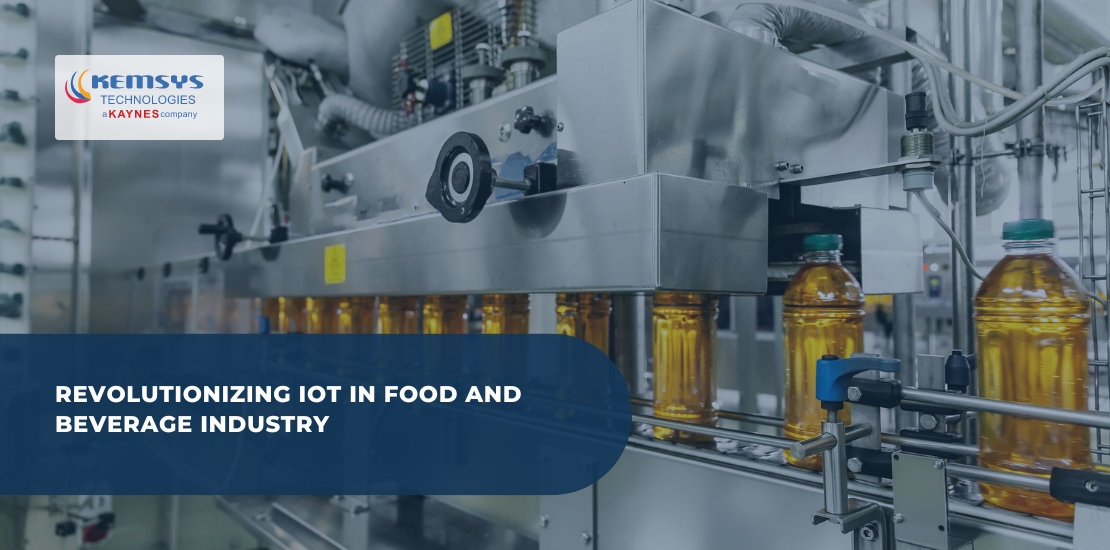- July 6, 2023
- Posted by: Kajal Sharma
- Category: Internet of Things

The food and beverage industry is undergoing a significant transformation, thanks to the rapid advancements in technology. The introduction of the Internet of Things (IoT) has revolutionized the way this industry operates, bringing about unprecedented opportunities for growth and innovation.
From ensuring the freshness and safety of food products to optimizing supply chains and enhancing customer experiences, IoT has become an integral part of the industry’s transformation. As businesses continue to leverage the power of connected devices, sensors, and data analytics, the future holds immense potential for further innovation and growth.
Embracing IoT is no longer an option but a necessity for food and beverage companies that aspire to stay competitive in an increasingly digitalized world. By harnessing the capabilities of IoT, the industry can thrive and meet the evolving needs of consumers while shaping a sustainable and efficient future.
In this article, we will explore how IoT is reshaping the food and beverage industry and unlocking new possibilities for success.
Understanding the IoT in Food and Beverage Industry
The Internet of Things in the food and beverage industry involves the utilization of advanced technologies such as artificial intelligence, machine learning, cloud computing, and data analytics.
These technologies are employed to streamline internal processes, automate tasks, and analyze data to gain insights into consumer behavior and preferences.
By harnessing this information, companies can make informed decisions that lead to more efficient operations, improved customer service, and the introduction of new products.

Automation and Robotics: Enhancing Efficiency and Reducing Costs
One of the key areas where IoT is making a significant impact in the food and beverage industry is through the use of automation and robotics.
These technologies are becoming increasingly popular as they streamline processes, reduce costs, and maximize efficiency.
Automated systems can be employed for packaging, scanning products, transporting goods, and even preparing meals.
Additionally, robots are being deployed to automate tedious tasks such as ingredient sorting and inspection of food products.
By integrating automation and robotics into their operations, companies can achieve higher productivity levels and optimize resource allocation.
Artificial Intelligence Transforming Customer Engagement
Artificial intelligence (AI) is also revolutionizing the way companies interact with customers in the food and beverage industry.
AI-powered chatbots, for example, can be used to answer customer queries quickly and accurately, leading to improved customer service and increased engagement.
By leveraging AI, companies can personalize their interactions with customers, leading to enhanced customer loyalty and increased sales.
Internet of Things: Enhancing Monitoring and Traceability
IoT technology is playing a crucial role in monitoring and traceability within the food and beverage industry.
Real-time monitoring of production processes allows for more efficient operations and improved traceability, ensuring companies can comply with food safety regulations.
By utilizing IoT devices, companies can track various factors such as temperature, humidity, and hygiene, providing instant insights into food safety.
This enables early detection of any issues, preventing potential damage and ensuring the highest quality of food products.
Blockchain Technology: Ensuring Transparency and Safety
Another area where IoT is making a significant impact in the food and beverage industry is through the use of blockchain technology.
Blockchain allows for the tracking of the origin of ingredients, ensuring that consumers have access to safe and healthy products.
By monitoring the entire supply chain, from farm to store shelves, blockchain technology provides a secure audit trail of information about each ingredient.
This is particularly beneficial for consumers with dietary restrictions or allergies, who need assurance that their food is safe and untampered with.
Blockchain technology ensures transparency, trust, and accountability within the food and beverage industry.
Augmented Reality: Creating Immersive Experiences
Augmented reality (AR) has become increasingly popular in the food and beverage industry as a way to provide customers with more engaging experiences.
AR can be utilized to provide interactive product demonstrations or virtual tours of production facilities.
This technology enables companies to create immersive experiences for customers, allowing them to interact with products in an engaging and entertaining way.
By integrating AR into their marketing strategies, companies can enhance brand awareness and customer engagement.
Mobile Apps and Online Ordering: Enhancing Convenience
Mobile apps and online ordering have become essential tools for success in the food and beverage industry.
These technologies enable customers to place orders quickly and conveniently, making it easier for companies to meet their needs.
Mobile apps can also be used to provide targeted promotions and discounts, driving sales and customer loyalty.
By embracing mobile apps and online ordering, companies can stay ahead of the competition and cater to the growing demand for convenient and seamless experiences.
The benefits of IoT in the food and beverage industry
IoT has revolutionized various aspects of the industry, enhancing efficiency, safety, and overall operations. Let’s explore some of the key benefits that IoT brings to the table:
Enhanced Food Safety and Quality Control
With IoT sensors and monitoring devices, food safety and quality control have reached new heights.
Real-time monitoring of temperature, humidity, and other environmental conditions ensures that perishable goods are stored and transported under optimal conditions.
Any deviations from the desired parameters can trigger immediate alerts, allowing swift corrective actions to maintain the freshness and quality of food products.
Improved Supply Chain Efficiency
IoT-enabled tracking systems provide end-to-end visibility across the supply chain.
From farm to fork, businesses can monitor the movement of goods, track inventory levels, and optimize logistics operations.
This streamlines the supply chain, reduces wastage, minimizes stockouts, and enables timely replenishment, ultimately resulting in cost savings and improved customer satisfaction.
Optimal Inventory Management and Shelf Life
IoT devices can monitor inventory levels in real-time, automating the process of inventory management.
By leveraging data analytics, businesses can accurately predict demand patterns, avoid overstocking or understocking, and optimize order fulfillment.
Additionally, IoT sensors can monitor the shelf life of products, ensuring that items are consumed or sold before expiration, reducing food waste and enhancing profitability.
Enhanced Agricultural Practices
IoT applications have transformed the way farming and agriculture are carried out.
Smart sensors and connected devices monitor soil moisture levels, weather conditions, and crop health, providing valuable insights for precision farming.
Farmers can optimize irrigation, fertilization, and pest control, leading to higher yields, reduced resource consumption, and improved sustainability.
Smart Kitchens and Restaurant Operations
IoT-powered smart kitchens enable automation and optimization of cooking processes.
Connected appliances and devices can communicate with each other, ensuring seamless coordination and precision in food preparation.
Inventory levels, order management, and customer preferences can be seamlessly integrated, leading to streamlined restaurant operations, faster service, and enhanced customer experiences.
Personalized Dining Experiences
IoT technology enables personalized dining experiences for customers.
From smart menus that recommend dishes based on dietary preferences to interactive ordering systems, IoT enhances customer engagement and satisfaction.
Connected devices can also collect data on customer preferences and behavior, enabling businesses to offer tailored recommendations, promotions, and loyalty programs.
Data-driven Decision Making
The vast amount of data generated by IoT devices empowers businesses to make data-driven decisions.
By analyzing data on customer preferences, supply chain performance, and operational efficiency, businesses can uncover valuable insights and identify areas for improvement.
This data-driven approach enhances agility, competitiveness, and strategic planning in the food and beverage industry.
Enhanced Traceability
The integration of IoT devices and blockchain technology ensures enhanced traceability within the food and beverage industry.
Companies can track the origin and journey of ingredients, ensuring compliance with food safety regulations.
This level of traceability provides consumers with peace of mind, knowing that the products they consume are safe and of high quality.
Revenue Growth
Implementing IoT technologies can offer manufacturers a competitive edge, leading to revenue growth.
By leveraging IoT-enabled solutions, companies can optimize their operations, reduce waste, and improve supply chain performance.
The ability to collect and analyze data from connected devices enables companies to make data-driven decisions, leading to improved business outcomes and increased profitability.
The Future of IoT in the Food and Beverage Industry
The Internet of Things is reshaping the food and beverage industry, unlocking new possibilities for growth and innovation.
As technology continues to advance and connectivity becomes more ubiquitous, IoT is poised to revolutionize the industry in the following ways:
Continued Automation and Optimization
IoT will drive further automation and optimization across the entire food and beverage ecosystem.
From smart farming practices and precision agriculture to automated food processing and packaging, IoT-enabled systems will streamline operations, reduce manual intervention, and enhance efficiency.
This will lead to increased productivity, reduced costs, and improved resource management.
Blockchain Integration for Transparency
The integration of IoT with blockchain technology will revolutionize supply chain transparency and traceability.
By combining IoT’s real-time data collection capabilities with the immutability and transparency of blockchain, stakeholders can track and verify the origin, quality, and movement of food products throughout the supply chain.
This will foster trust, mitigate food fraud and contamination risks, and ensure compliance with regulatory standards.
AI and Machine Learning Applications
The synergy between IoT and artificial intelligence (AI) will unlock new possibilities in the food and beverage industry.
AI algorithms can analyze vast amounts of data collected by IoT devices, uncover patterns, and generate actionable insights.
This can drive predictive maintenance of equipment, optimize inventory management, and enable personalized recommendations for consumers based on their preferences and consumption patterns.
Enhanced Food Safety Measures
IoT will play a pivotal role in further enhancing food safety measures. Smart sensors embedded in food packaging can provide real-time information about the product’s freshness, temperature, and safety.
Consumers will have access to this data, enabling them to make informed decisions and avoid consuming potentially unsafe food items.
IoT can also enable proactive monitoring and early detection of foodborne illnesses, enabling rapid response and containment.
Personalized Nutrition and Dietary Management
With IoT-enabled devices and wearables, personalized nutrition and dietary management will become more accessible and effective.
Connected devices can track individuals’ dietary intake, exercise patterns, and health parameters, providing personalized recommendations and feedback.
This will empower consumers to make healthier choices and manage their diets more effectively, leading to improved well-being and preventive healthcare.
Smart Retail and Shopping Experiences
IoT will reshape the retail landscape in the food and beverage industry. Smart shelves, equipped with sensors, can automatically monitor inventory levels and trigger restocking notifications.
Connected refrigerators can generate shopping lists based on their contents, enabling consumers to conveniently order groceries.
IoT-enabled mobile apps and smart payment systems will enhance the overall shopping experience, allowing for seamless transactions and personalized offers.
Sustainability and Waste Reduction
IoT has the potential to contribute significantly to sustainability efforts in the food and beverage industry. Smart sensors can monitor energy consumption, optimize resource usage, and identify areas for waste reduction. IoT-enabled precision farming practices can minimize water usage and decrease reliance on pesticides, promoting sustainable agriculture. Additionally, IoT-driven data analytics can help identify inefficiencies in the supply chain, reducing food waste and promoting circular economy practices.
The future of IoT in the food and beverage industry is bright and promising. As technology continues to evolve and become more widespread, it will bring forth innovative solutions, improved safety measures, personalized experiences, and sustainable practices.
Embracing IoT will be crucial for businesses in the industry to stay competitive, meet consumer expectations, and navigate the rapidly changing landscape of the digital era.
Elevate Your Food and Beverage Business with Kemsys IoT solutions
In the quest to unlock the future of the food and beverage industry, harnessing the power of IoT is paramount. Kemsys a leader in innovative technology solutions, can be your trusted partner in implementing IoT to revolutionize your operations.
Wiith Kemsys tailored IoT solutions you can:
- Gain real-time insights into the entire supply chain, from sourcing ingredients to product distribution, ensuring optimal freshness, quality, and traceability.
- Utilize IoT sensors and devices to monitor critical parameters such as temperature, humidity, and storage conditions. Proactively detect anomalies, prevent spoilage, and optimize operational efficiency.
- Implement automated monitoring systems that continuously collect and analyze data, enabling you to maintain consistent quality standards throughout the production process.
- Leverage IoT technologies to automate data collection, reporting, and compliance with food safety regulations. Streamline audits and ensure adherence to industry standards.
- By leveraging IoT-enabled smart devices, get personalized product recommendations, track consumer preferences, and create engaging experiences
Partnering with Kemsys empowers your business to unlock the full potential of IoT in the food and beverage industry. It enables you to stay ahead of the competition, drive operational excellence, and deliver superior products to consumers.
Ready to transform your food and beverage business with cutting-edge IoT solutions?
Understanding the IoT in the food and beverage industry is crucial for businesses to stay competitive and thrive in a rapidly evolving landscape.
Discover the power of Kemsys and embark on a journey towards innovation today! Contact us for a consultation and take the first step towards a smarter, more efficient future.”
Final Thoughts
The benefits of IoT in this industry are immense, ranging from enhanced food safety and quality control to improved supply chain efficiency and personalized experiences for consumers. By embracing IoT technologies, businesses can optimize their operations, reduce costs, and make data-driven decisions.
Looking ahead, the future of IoT in the food and beverage industry holds even greater promise. The integration of IoT with other technologies like blockchain, AI, and machine learning will unlock new opportunities for automation, transparency, and sustainability.
From smart farming practices to personalized nutrition management, IoT will continue to reshape the industry, offering innovative solutions and improved experiences for both businesses and consumers.
By embracing IoT and staying abreast of its advancements, businesses in this industry can unlock new opportunities, gain a competitive edge, and create a sustainable future for themselves and their consumers.

